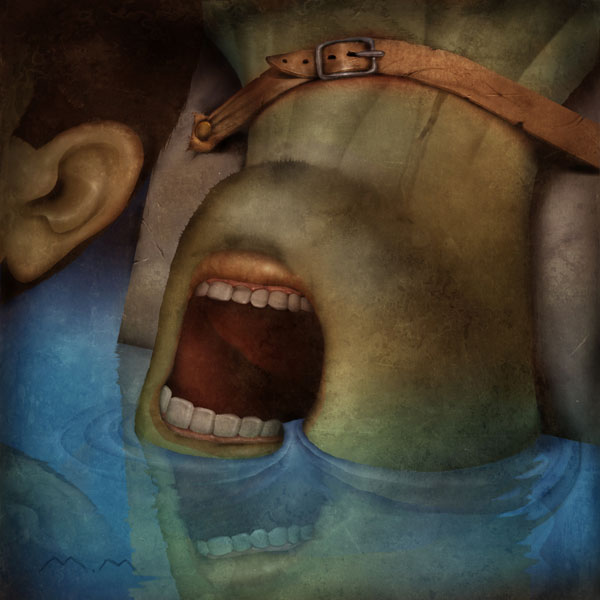Former FBI Agent Testifies to CIA Contractor Push for Harsh Interrogation
A single psychologist pressed for the use of a confinement box in the interrogation of an al-Qaeda operative.
Jul 31, 20209.7K Shares130.1K Views
Illustration by: Matt Mahurin
Ali Soufan, the former FBI agent who helped interrogate detained al-Qaeda operative Abu Zubaydah, told lawmakers Wednesday that he wasn’t the only interrogator who opposed torturing Abu Zubaydah at a CIA-operated facility in the spring of 2002. According to Soufan, all the members of the CIA’s interrogation team stood against a single CIA “contractor” who advocated such techniques as placing the detainee in a “confinement box.”
Testifying before a Senate Judiciary subcommittee, Soufan — whose face was dramatically concealed behind a wooden partition in order to protect his identity — gave an account of the fateful interrogation that went further than what he wrote in a New York Times op-edon April 22. In that op-ed, Soufan wrote that he opposed using harsh interrogation techniques on Abu Zubaydah, especially after non-physical techniques resulted in valuable intelligence, such as a positive identification of 9/11 mastermind Khalid Shaikh Mohammed. He wrote that unnamed CIA colleagues also “balked at the techniques” but were “instructed to continue” with using them. Soufan added that “it was contractors, not CIA officers, who requested the use of these techniques.”
Illustration by: Matt Mahurin
In his testimony, though, Soufan said that “FBI and CIA all had the same opinion that contradicted with the contractor.” The contractor in question has been identified by Jane Mayer of The New Yorkeras James Mitchell, a former psychologist with the military’s Survival, Evasion, Resistance and Escape (SERE) program. According to the Senate Armed Services Committee’s recently declassified report on torture, the SERE program became the basis for much of the brutal interrogations by the military; and former Justice Department Office of Legal Counsel chief Steven Bradbury testified in 2008that versions of SERE techniques were the basis for the CIA’s “enhanced interrogation” program. An August 1, 2002 memorandum written by Jay Bybee, one of Bradbury’s predecessors at OLC about the legality of a proposed interrogation regimen for Abu Zubaydah refers to a “Survival, Evasion, Resistance, Escape (‘SERE’) training psychologist who has been involved with the interrogations since they began.”
TWI pointed to some apparent discrepancies between Soufan’s account of his opposition to torture and the findings of the Justice Department inspector general in a 2008 report, but Soufan said little to address those questions at the hearing, giving instead a forceful rejection of the morality and efficacy of torture. He said torture had no place in interrogations, calling it “harmful, shameful, slower, unreliable, ineffective and play[s] directly into the enemy’s handbook.”
Soufan wrote in a prepared statement that “a top CIA interrogator” protested the contractor’s “untested theory” when the contractor attempted “loud noise and then temperature manipulation.” A different member of the interrogation team, whom Soufan identified as an “operational psychologist for the CIA,” allegedly “left the location” after objecting to the attempts to torture Abu Zubaydah. All of these attempts occurred weeks before the OLC gave legal approval for the regimen of interrogation techniques based on the SERE program on August 1, 2002.
If Soufan’s presentation is correct and the FBI and CIA interrogators raised objections to the harsher methods proposed by the SERE psychologist working as a CIA contractor, it raises the question of how CIA interrogators in the field could have been overruled by higher headquarters in favor of a contract employee. According to the Senate Select Committee on Intelligence’s narrative of the legal development of torture during the Bush administration, by mid-May 2002, “the CIA believed that Abu Zubaydah was withholding imminent threat information during the initial interrogation sessions,” leading senior CIA attorneys to confer with their Justice Department and White House counterparts to discuss the legality of using brutal interrogation techniques on Abu Zubaydah. By July 2002, then-national security adviser Condoleezza Rice told then-CIA Director George Tenet that “the CIA could proceed with its proposed interrogation of Abu Zubaydah.”
Since Soufan had left the interrogation by June 2002 — though a Justice Department inspector general report last year put his departure at some time in May — that would mean senior CIA officials discussed torturing Abu Zubaydah weeks after CIA officials who were part of the Abu Zubaydah interrogation team objected to such treatment.
CIA officials signaled opposition to Soufan’s characterization of the Abu Zubaydah interrogation. “Today we heard one account of the interrogation of Abu Zubaydah,” said CIA spokesman George Little in an email message. “There are others.” He did not elaborate.
Chris Anders, senior legislative counsel of the ACLU, said Soufan’s account raised questions about whether senior CIA officials should have pushed for the abusive techniques ultimately approved by the OLC. If CIA interrogators “are raising concerns about ‘borderline torture,’ [and asking] is this legal, those kinds of things, that certainly would go to whether there should’ve been good-faith reliance on later legal opinions,” Anders said. “It certainly goes to people at the CIA and top levels of the administration — whether they should have been just relying on the Bybee opinions because they were getting conflicting advice.”
Air Force Reserve Col. Steve Kleinman, a former military interrogator who worked with both Mitchell and Mitchell’s SERE collegue and business partner Bruce Jessen — whom the Senate report identified as a major advocate for using SERE techniques on detainees in U.S. custody — submitted a statement to the Judiciary subcommittee opposing torture. Even so, he said that placing blame exclusively on Mitchell and Jessen — whom he said played major roles improving the SERE program so that U.S. troops were better trained to withstand torture — would be a mistake.
“As much as I find absolutely disgusting the things they did — it never should’ve happened and the should take responsibility for what they did — they never should’ve been allowed to be where there were” in the interrogation of Abu Zubaydah, Kleinman said. “They didn’t go to CIA six guns a-blazing. They were brought in with eyes wide open, to run an interrogation program. While I disagree with their methods profoundly, there were people in the chain of command above them who set them up for failure.”

Rhyley Carney
Reviewer
Latest Articles
Popular Articles

